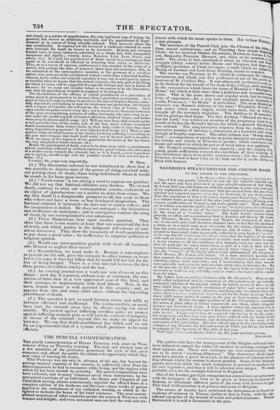TIIE PURCELL COMMEMORATION.
THE yearly commemoration of HENRY PURCELL took place in West- minster Abbey on Thursday morning. The zeal mid musical taste of a few members of the profession perpetuate the style of this great composer, and afford the public the almost sole opportunity which they now enjoy of hearing his works. That PURCELL was not only in advance of his age, but beyond the average musical capacity of his country, is sufficiently clear from the discouragements he had to encounter while living, and the neglect with which he has been treated by posterity. His sacred compositions have been collected, and in many instances saved from destruction, by the unrequited exertions of an individual : the Deans and Chapters of our Cathedrals having, almost unanimously, rejected the offered boon of a complete edition of his Anthems and Services—those works of genius applied to the enrichment of our cathedral worship, to which he de- lighted to dedicate the hours of his brief existence. The most accom- plished musicians of other countries peruse the scores of PURCELL with wonder and delight ; and even untutored ears can feel the soul and scn- timent with which his music speaks to them. But to hear PaRcz4.4 a rare pleasure.
The members of the Purcell Club join the Chorus of the Abbe? these annual celebrations ; and on Thursday they almost fortse4 Choir for WC observed HOBBS, 13RADRURY, HAWKINS, LUCAS, E.T, Loa, BELLAI■ty, FRANCIS, MOXLEY, and other of its members, j11114; stalls. The choir, in fact, consisted of about its intended and for strength (thirty voices) before Deans and Chapters had begat profligate spoliation of Choir revenues ; a work which we suppose Bishop of LONDON and Lord JOIIN RUSSELL intend to complete. The service Was PURCELL in D ; which he composed for vakestli, instruments, and which was first performed at one of the yearly eeh. brations of St. Cecilia's Day. It was afterwards performed ever-y,tt at the festival for the benefit of the Sons of the Clergy, until supersiiti by the composition which bears the name of HANDEL'S "DettingesT, Demn," but which is little more than a judicious and successful compi, lotion. This is the more showy and popular work, but for truth RA force of expression—for a just and emphatic musical expression words, PURCELL'S "'Fe Deum" is unrivalled. The most finished pe. formance was tionns's delivery of the verse " Vouchfafe, 0 task under which many singers would have sunk, but to whichlt brought all the necessary requisites. The Jubilate in D succeeded- with its glorious final fugue. The first Anthem, "Blessed are they tia fear the Lord," was written on occasion of the pregnancy (real or sq. posed) of JAMES the Second's Queen, for which a general thanksginig was ordered. The congratulatory response from the trebles, me* successive promise of blessing is 'announced, is a beautiful and origin thought as happily expressed. The other anthem was "0 sing moat Lord,"—a composition of which the majestic character served to display the variety and extent of PURCELL'S genius ; which embraced eye! theme and subject to which the power of vocal music was applicable. Mr. TURLICS aCCOMpalliMera was masterly ; and the singing oflaji young pupils sufficiently evinced the excellence of their training. Co this celebration there is no public announcement ; but the adtairersof Punem.a seemed to have been on the look-out for it, as the Abbey filled with hearers.


























 Previous page
Previous page